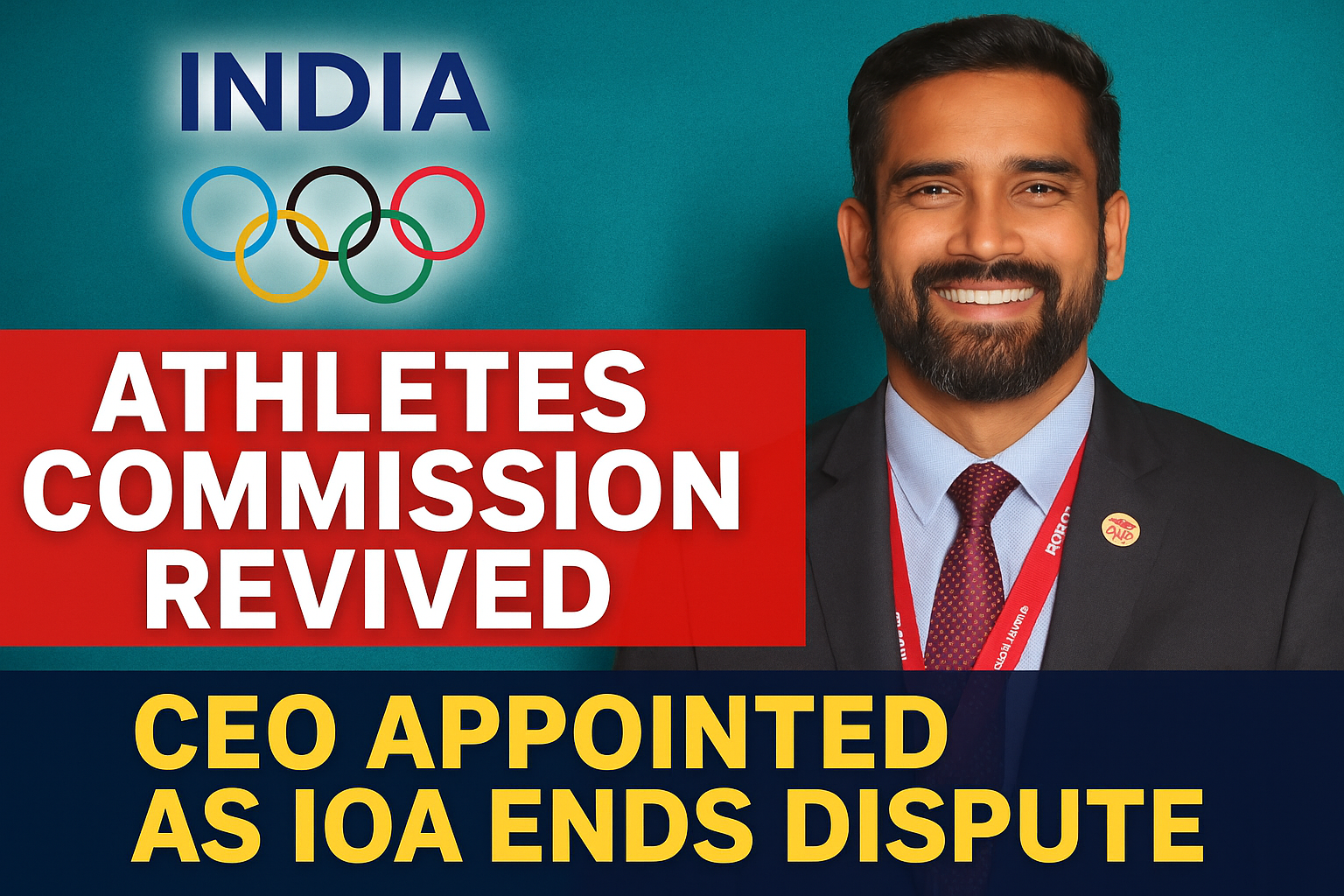
The Indian Olympic Association (IOA) has entered a new phase of change and rebuilding. Two major steps show that it is serious about moving forward—first, the revival of the long-ignored Athletes Commission (AC), and second, the end of internal power struggles with the formal appointment of Raghuram Iyer as CEO. These changes aim to bring back trust in the IOA and create a system that supports athletes better, especially as India aims to host the 2036 Olympics.
Athletes Commission Gets a Fresh Start
The IOA’s Athletes Commission was earlier launched by boxing legend Mary Kom, but over the last 18 months, it had become inactive due to problems within the IOA. Now, with star table tennis player Sharath Kamal as vice-chairperson, the Commission is ready to work again.
Sharath Kamal’s main goal is to reconnect with sports federations and make sure athletes are heard. His first action is to ask all National Sports Federations (NSFs) to name athlete representatives who can work directly with the Commission. He says each federation should have at least two athlete members, especially if they haven’t set up their own athlete group yet.
He believes the Commission should not just exist in name but must play an active role in important decisions. These include matters like athlete welfare, anti-doping rules, education, and support after retirement. He also wants to build systems to help athletes with mental health, legal advice, and career planning after sports.
Winter Olympian Shiva Keshavan, who also holds a key post in the Olympic Council of Asia, strongly supports this mission. He says athletes must be included in every major decision. According to him, athlete-cantered thinking, not just paperwork, should guide Olympic planning.
The Commission plans to launch a national campaign on August 29, 2025, which is also National Sports Day. This campaign will push for more athlete involvement and public awareness. It will involve top Indian athletes, Olympians, and retired players in leadership and reform work.
One major challenge is funding. During the recent leadership crisis, many IOA programs were paused. Now, Sharath Kamal hopes the Commission will receive proper support from both the IOA and global bodies like the International Olympic Committee (IOC) and the Olympic Council of Asia (OCA).
Sharath also shared his experience from attending the International Athletes' Forum in Lausanne, Switzerland. There, he saw that other countries had strong athlete commissions that were part of real decision-making. India, he says, is trying to catch up.
IOA Ends Internal Conflict, Approves New CEO
In another major step, the IOA’s executive council officially approved Raghuram Iyer as its new CEO. This decision came after months of disagreement between IOA president PT Usha and other members. The fight had delayed major projects and hurt India’s Olympic planning.
At a recent executive meeting, senior members like Ajay Patel and Gagan Narang joined with other officials such as Mary Kom, Alaknanda Ashok, Harpal Singh, and Rohit Rajpal. Athlete leaders like Sharath Kamal also attended. For the first time in months, everyone worked together calmly.
PT Usha said the IOA is now focused on unity and shared goals. She added that Iyer was chosen for his experience and leadership skills. Joint Secretary Kalyan Chaubey noted that while there were earlier disagreements, the final vote was in full agreement. Iyer's salary is set at ₹20 lakh per month.
In the past, there were complaints about delayed grant releases from the Sports Ministry and problems in governance. Even IOC officials had warned that if these problems continued, India might lose chances to host global events like the Olympics or Commonwealth Games.
Now, the IOA is working to rebuild trust with the Sports Ministry. They hope to speed up financial processes and prepare both short-term plans and long-term goals for India’s sports future.
Gagan Narang Supports Sports Code for Fairness
Adding to the reforms, Olympic shooting medallist Gagan Narang spoke in favor of the new National Sports Code Governance Bill. This bill is expected to bring fairer rules and better management to India’s sports federations.
Narang believes this is the right time for change, as India gets ready for big sporting events. He says the bill will help make federations more honest and athlete-friendly. The reforms will push for proper money use, fair team selections, and better sports infrastructure.
A Turn Toward Athlete-First Governance
These recent steps show that the IOA is serious about improving Indian sports. The revival of the Athletes Commission and the end of leadership fights point to a better future for athletes. With stronger athlete representation and smoother administration, India is now better prepared to chase its Olympic dreams.
However, success will depend on steady action, proper funding, and winning back the trust of athletes. If these reforms are followed through, the IOA could soon become a model of athlete-first leadership in Asia and beyond.





















